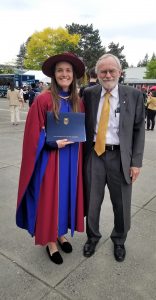While Dr. Katie Koralesky is currently a post-doctoral fellow with the AWP, she also completed her MSc and PhD with the group under the supervision of Dr. David Fraser. We asked about her PhD research experience in celebration of the conferral of her doctoral degree on June 2nd!
During her PhD research, Katie used a novel research approach known as “Institutional Ethnography” (IE) founded by Dr. Dorothy E. Smith. This sociological approach was core to her work but it had not previously been applied to the field of animal welfare research. You can learn more about this approach in a documentary featuring Dr. Smith which highlights Katie’s use of IE. We explore Katie’s PhD experience below.

Can you describe your PhD thesis topic?
Animal protection organizations commonly provide care for animals in shelters, enforce animal protection laws, and take initiatives to keep people and animals together. However, ensuring animal welfare in this work is not straightforward. In the shelter environment, animals are evaluated using legal criteria and other measures based on their welfare and living situations with their owners; the animals are also categorized according to their property, health, and adoptability status. I used institutional ethnography to explore how the everyday work of animal sheltering and protection (e.g. work processes, policies, and laws) organizes what happens to animals.
What drew you to your research topic and how did you develop it?
I was introduced to IE at a workshop led by Dr. Janet Rankin and soon after began developing my thesis topic with my supervisor Dr. David Fraser. Having been a volunteer with animal sheltering organizations in the USA and Canada for the past 12 years, I reflected on my volunteer experiences with animals, animal care staff and animal protection officers. I came to realize that the way in which animals are cared for and how decisions are made about them is organized by a complex system of institutional policies and procedures. Ensuring animal welfare through this work is sometimes difficult. For example, concerns may arise where the outcome of a situation (as well as the work of making the decisions that result in that outcome) is not in the interests of the animal nor desired by the staff and organization. Thus, I began my research by observing how staff, officers and call centre operators worked with animals including how they understood and followed protocols, policies and laws, and I paid close attention to concerns that arose while people did this work.
How is institutional ethnography new to animal welfare research?
A lot of social-science research tries to apply theories and uses standard methods of data collection, such as questionnaires. With IE, the focus is on the actual, ongoing work that people do and how they coordinate their work with others. It tries to capture what it is like to actually do the work of animal protection, the challenges that people face and the constraints that they work under because of organizational policies and procedures.
How could institutional ethnography be used in the future of animal welfare research? And how does this influence your choice of methodology in your research moving forward?
IE has had an enormous impact on how I think about animal welfare research. One IE principle that I consistently apply in research is to consider how foundational theories or methodologies become established. Understanding how existing knowledge about topics is influenced – and sometimes limited – by such theories and methods can be incredibly insightful. Finally, I hope to use IE in future research. Humans care for animals around the world in settings where their work is organized by institutional processes. IE could be applied to laboratories where animals are used for scientific research, to farms that follow industry, government, or corporate farm animal welfare assurance programs, or to wildlife centres, for example, zoos, aquariums, and rehabilitation hospitals, that follow institutional standards of care.
Katie’s post-doctoral research focuses on the social, moral, and ethical dimensions of gene editing in farm animals. We are thrilled to celebrate Katie’s convocation and continue working together to improve the welfare and humane care of animals through research, education, and outreach.